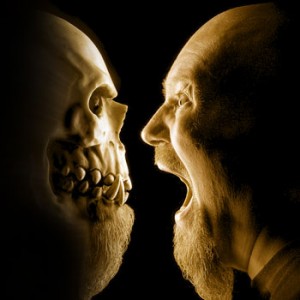 Among the best predictors of the long-term viability of a human community are the values held by its members. Those values, of course, are demonstrated in the behavior of community members which are especially visible in its high-profile leaders. Fundamental beliefs are also revealed by the behavior of community members. In the U.S. one of the most common beliefs (also common in the rest of the world) is that the universe is unfriendly, expressed in such sentiments as: “survival of the fittest” and “this is a dog-eat-dog world.”
Among the best predictors of the long-term viability of a human community are the values held by its members. Those values, of course, are demonstrated in the behavior of community members which are especially visible in its high-profile leaders. Fundamental beliefs are also revealed by the behavior of community members. In the U.S. one of the most common beliefs (also common in the rest of the world) is that the universe is unfriendly, expressed in such sentiments as: “survival of the fittest” and “this is a dog-eat-dog world.”
Loath to admit this bleak outlook, many Americans will object to this characterization of our society. All the denial in the world cannot conceal our everyday behaviors, however. All we have to do is open our eyes and the predatory false self stands revealed. We can hope for peace of mind but we will get existential anxiety; we can hope for generosity but we will get grasping greed; and we can hope for compassion but we will get violence and cruelty.
The exemplary predator in our story, salivating as he searches for gazelles to devour or sheep to “fleece” is Jeff Bezos, Amazon’s chief executive. The Everything Store: Jeff Bezos and the Age of Amazon by Brad Stone helps remove the sheep’s clothing from our American wolf.
Don’t worry, anxious reader, Stone said that Mr. Bezos was “in the end supportive of this project [Stone’s book].” In any case, we are using Bezos as a metaphor for all of us in P-B, so we are not accusing him of behavior any more reprehensible than most of us have been guilty of at one time or another.
What stands revealed in our behavior as Americans are the attitudes, beliefs and values of a dysfunctional community frantically telling itself the story it wants to believe and unconsciously concealing the real narrative, out of sight and out of mind, floating just beneath the surface.
Starting out Amazon developed a relationship with the smaller book publishers which eventually became dependent on Amazon. These became the gazelles to Amazon’s cheetah. Using methods reminiscent of Carnegie, Rockefeller, Mellon and Morgan, Bezos proved to be more ambitious and ruthless than a mere book peddler. “The company’s relationship with those publishers was called the Gazelle Project after Mr. Bezos said Amazon ‘should approach these small publishers the way a cheetah would pursue a sickly gazelle.’” That pursuit involves putting the squeeze on them by demanding steeper discounts, longer periods for Amazon to pay for books and better shipping services.
The attitude that Amazon had toward its competition inevitably infused itself into the culture of the company and the employees began to look like gazelles to management. “He [Stone] describes the in-house culture as ‘notoriously confrontational,’ and writes that because managers in departments of 50 or more people are required to “top-grade” their subordinates along a curve (and dismiss the least effective performers), ‘many Amazon employees live in perpetual fear’ of termination.”
Valuing competition (P-B) over cooperation (P-A), Amazon’s initial goal became the elimination of all competition in the book publishing, marketing and distribution business. From its founding in 1995 it has more than exceeded the founder’s expectations by becoming, as Brad Stone’s book title indicates (with only a slight exaggeration), a store that sells “everything.” Amazon has become the Internet’s top retailer.
Amazon is not the only predator in the jungle of American capitalism. Breathing down its neck, crashing through the underbrush, smelling blood and wanting to be the next king of the jungle comes—you guessed it—Wal Mart!
________________________________________________________________
References and notes are available for this essay.
Find a much more in-depth discussion in books by Roy Charles Henry:
Who Am I? The Second Great Question Concerning the Nature of Reality
Where Am I? The First Great Question Concerning the Nature of Reality
Simple Reality: The Key to Serenity and Survival


